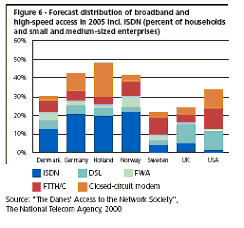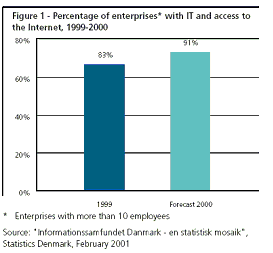| |
Information Technology in Denmark | |
| |
Team | About Denmark | Network Access | Network Learning | Network Society | Network Economy | Network Policy | Offshore Readiness | Resources | | |
Network SocietyDanish citizens have eagerly embraced the network society. This openess has allowed Denmark to aspire to and develop a knowledge-based and networked New Economy. There has been a combined effort from the public and private communities to create a full-scale “Digital Denmark”. Several factors are prevalent in Denmark’s ambition to be
a world-class networked society: Since the autumn of 1999 the IT University of Copenhagen and IT
University West offered Denmark is also emulating some global cities that concentrate IT from both corporate and educational entities into IT cities. These areas or regions include research centers, incubation centers, university departments and IT business undertakings. The Aarhus region is focused on technologies such as object-oriented software, embedded software, next generation web technology, medical imaging and man-machine interaction. Denmark is hampered in their TI goals by a lack of qualified IT-personnel. Even with the emphasis on education and expansion of IT knowledge, according to the Danish Institute of Technology, Denmark will be in need of as many as 20,000 qualified IT-workers in the next few years. Denmark is described as the No. 1 European broadband nation, possessing the greatest number of high-speed Internet connections when proportioned to the size of any given population. In the so-called Digital Access Index (DAI) prepared very recently by the International Tele-Communication Union (ITU), Denmark moreover takes a noteworthy second place, only narrowly outperformed by Sweden. Denmark is a highly computerized and very PC/LAN oriented market that is constantly growing. Denmark is among the countries having one of the highest per capita usages of the Internet. According to ITU, the estimated number of Danish Internet users added up to 2.5 million citizens in 2002, this figure having grown by 54% since 1999. Danmarks Statistik estimated that as much as 81% of the Danish population or more than 4.3 million people had access to the Internet, of whom 44% from their homes in the form of broadband connections. The 81% figure is the second-highest access rate found anywhere in the world. Nine out of 10 Danish companies having 5 or more employees are
connected to the Internet, and among those 45% operate on the basis
of broadband ADSL or even faster connections.  More than 90 percent of all enterprises with ten or more employees
make use of information technology in the form of PCs or similar.
While only a couple of percent of enterprises with a hundred employees
or more do not make use of IT, this applies to more than a tenth
of the enterprises with between ten and nineteen employees. 
|